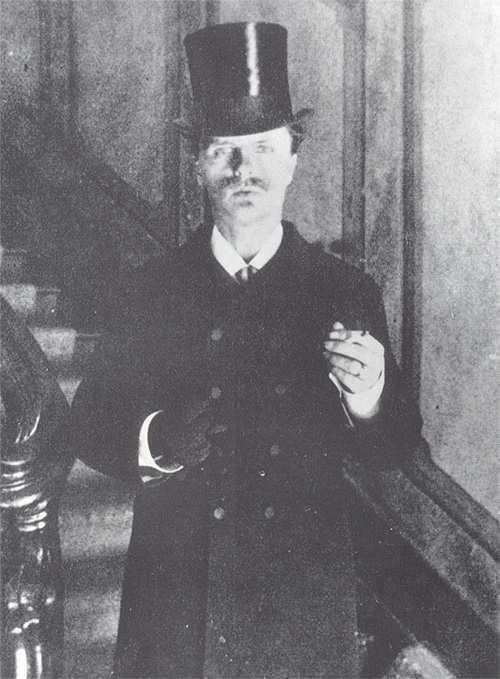August Strindberg
1849: Born in Stockholm shortly after father's bankruptcy
1871: The Outlaw produced
and
honored by king
1873/1878/1880: Master Olof
1874: Assistant librarian at Royal Library in Stockholm
1877: Marries Siri von Essen, who divorces for his sake
1879: The Red Room
(novel)
1883: Leaves Sweden for France, Switzerland, and Germany
1884-86: Marriages
(short stories)
1887: The Father (Fadren)
1888: Realist writer Victoria
Benediktsson commits suicide (Törnqvist and Jacobs 102,
Robinson xvi-xvii); Miss Julie
banned while still in dress rehearsal
1889: Starts Scandinavian Experimental Theatre in Copenhagen
w/actress wife
1891: Ibsen's Hedda Gabler
1892: Divorce from first wife
1893: Marries Austrian Frida Uhl and divorces her shortly
thereafter
1895-1906: So-called Inferno period (studies occult and
Swedenborg)
1897: Returns to Sweden
1901: Marries actress Harriet Bosse; Dream Play written
1906: Premier of Miss Julie in Stockholm
1907: Founds Intimate Theatre in Stockholm, premier of Dream Play
1912: Dies of stomach cancer
30 Jan. 1947 NYC: performed as
The Mistress of the House,
with Miss Julie as a white daughter of a plantation owner, and
the servants played by African Americans
Historical Context
1848
|
Revolutions in Europe
|
1853
|
Wagner begins The
Ring cycle of operas
|
1862
|
Hugo's novel, Les
Miserables
|
1874
|
Beginnings of Impressionism in painting
|
1888
|
Strindberg's Miss
Julie
|
1898
|
Freud's Interpretation
of Dreams
|
1899
|
Van Gogh and Gauguin paintings exhibited in Paris; first
German expressionistic gathering
|
1908
|
Strindberg's The Ghost Sonata
|
1919
|
Brecht's first play, Baal, appears in Berlin
|
A. Strindberg Quotes:
"Am I out of kilter, since I was born in the good old
days, when people had oil lamps, stagecoaches, boatwomen, and
six-volume novels? I have passed with involuntary haste through
the age of electricity, as a result of which I have possibly
lost my breath and got bad nerves! Or is it that my nerves are
undergoing an evolution in the direction of over-refinement, and
that my senses have become all too subtle? Am I changing skin?
Am I about to become a man of today? . . . I am as nervous as a
crab that has cast off his carapace, as fretful as the silkworm
in its metamorphosis" (qtd. in Szalczer 42-3).
Works Cited
Szalczer, Eszter. "Strindberg
and
the Visual Arts." PAJ: A
Journal of Performance and Art 25.3 (2003): 42-50.
What is
Naturalist Drama?
Naturalism from OED:
"In literature, theatre, cinema, etc.
Used especially to
refer to a style of novel in which reality was presented without
moral judgement."
In European (German, Norwegian, Scandinavian, and Austrian)
theater:
- Movement that follows Romantic theater (far-flung
historical contexts, great/noble heroes, lengthy monologues,
spectacular backdrops [screens] as sets)
- Employs real scenery such as furniture (as opposed
to a picture of a chair or desk)
- "In naturalism, a close cousin of realism, dramatic
events (often tragic) and characters (often working class or
poor) were portrayed in as 'natural' a manner as possible,
with little embellishment. Characters in naturalistic dramas
or novels are understood to be at the mercy of their
environment, as opposed to characters in a romantic play,
who are at the mercy of their emotions" (Belanger 2005).-- Warning from Dr. Nielsen
about this quote: This might be an oversimplification,
because Romanticism actually refers to the movement in
literature (ca. 1780 to 1830) that focuses on complex
political and historical themes, not just emotions. Nor does
Naturalism necessarily refer to acting what we might
understand to be "natural." Rather, it refers to humans in
their natural world: that is, not noble people (instead, the
workers and the bourgeoisie), and at home, not in a foreign
land 500 years ago (as was common with Romantic drama).
- Features drama with slightly more serious topics
than the other main attraction of the day, melodrama
- Shocking themes such as incest, syphilis, pregnancy,
alcoholism, abortion, adultery, etc.
- Made for more intimate settings like the Free Stage
in Berlin, or Strindberg's playhouses (as opposed to grand,
cavernous spaces seating 3,000 plus spectators)
- Practitioners sought to "remove the barrier
separating theatre from life, to create an illusion so
powerful that it would render the theatrical medium
absolutely transparent" (Williams 285).
Advisory:
American literature's naturalism succeeded the realist movement
in fiction, and was hallmarked by authors like Stephen Crane and
Jack London (Caserio 2005). Please note that Naturalist theater
did not actually achieve "realism" as we understand it today.
Rather, playwrights sought to make apparent the so-called truths
of bourgeois family life, such as alcoholism, adultery,
syphilis, hereditary disease, unplanned pregnancies, abortion,
and other signs of social decay.
Works Cited:
Belanger, Craig. "August Strindberg: 'Miss Julie' and the Inferno
Period." Literary Reference
Center. MSU. Jan. 2006.
<http://search.ebscohost.com/login.aspx?direct=true&db=lfh&AN=19326925&site=lrc-live>
Accessed
Feb. 2008.
Caserio, Robert L. "Fiction
Theory
and Criticism: 2. British and American."The Johns Hopkins
Guide to Literary Theory and Criticism. 2nd Ed. 2005. MSU. Accessed
Feb. 2008.
<http://litguide.press.jhu.edu.ezproxy.montclair.edu:2048/cgi-bin/view.cgi?eid=95&query=naturalism>
Robinson, Michael. "Introduction." Miss Julie and Other Plays by August Strindberg.
Oxford: Oxford UP, 1998. vii-xxxvi.
Törnqvist, Egil and Barry Jacobs. Strindberg's
Miss Julie: a Play and Its Transpositions. Norwich: Norvik,
1988.
Williams, Kirk. "Anti-theatricality
and
the Limits of Naturalism." Modern Drama 44.3 (Fall 2001): 284-300.
Group Discussion
Question:
Discuss the roles of mothers and fathers in A Doll’s House, Hedda Gabler, and Miss Julie. What does
their absence—and presence—mean?
Wendy C. Nielsen, "Miss Julie," Modern European Drama, Feb.
2008 <http://chss.montclair.edu/~nielsenw/strind_julie.html>

